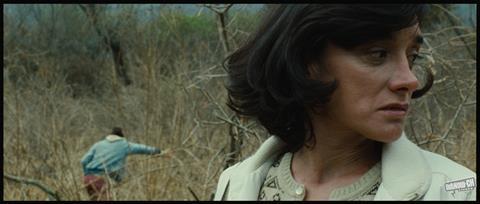Dir/scr: Lucrecia Martel. Argentina-Spain-France-Italy. 2008. 87mins.

Lucrecia Martel asks way too much of the viewer in her third feature, a dour tale of moral and social paralysis centring on a hit-and-run incident in an Argentinian rural backwater and its effects on the woman at the wheel. At first the Latin American auteur’s long-awaited new film looks like it is about to build the same edgy mix of family drama, visual symbolism, social critique and menacing atmosphere that distinguished her first two features, La Cienaga and The Holy Girl. But in The Headless Woman, Martel lets the miasma blur the drama and stifle the story. The result is a ‘plotless film’ that, in its Cannes press screening, prompted walkouts and boos, although many still maintain that the film’s advanced symbolic and narrative sudoku is worth puzzling out.
It’s a shame, because the film proves that Martel is still one of the most original young directors we have. Her framings, the layering of apparently inconsequential dialogue, her feel for threat-laden sound design are as good as they ever have been here, and she coaxes fine performances from her actors. Despite the muscle of Focus Features International and the co-production imprimatur of the Almodovar brothers’ El Deseo, Martel’s Cannes competition is going to be a hard sell.
All that we can say for sure about Vero (Onetto), the film’s unwavering focus, is that she is a well-off, well-preserved middle-aged woman who works with her brother (even this is unclear) in a dental surgery somewhere in the Argentinian backlands (the unnamed location is once again Martel’s home province of Salta, a thousand miles north-east of Buenos Aires). Reaching for her mobile phone on a deserted country road, Vero runs something, or someone over - and, unable to get out of the car to look, simply drives on.
Keeping the accident to herself, Vero enters a kind of trance state, going through the motions of daily life in her close-knit bourgeois family without really knowing what she’s doing, where she is, or who’s who. When she finally gets around to confessing her worries to her husband, Vero lets herself be persuaded that she only hit a dog - though a post-accident rearview mirror shot makes it perfectly clear that she knows that this isn’t true.
Shot from behind glass, in mirrors, through doors and over shoulders, the film makes Vero’s disorientation, paralysis and distance its own - so we too find it hard to distinguish the people who surround her. Characters come and go in a chaotic dance around Vero herself, sensitively played by Onetto, whose fixed smile and rigid bearing tip us off (but not, most of the time, her family) to the trauma and guilt she’s bottling up inside.
Families, Martel tells us, deal with strangeness by normalising it; and only a confused elderly aunt spots that Vero has ‘a strange voice’. The director is interested in the way chatter masks damage - and so we get lots of chatter, about polluted swimming pools, upcoming marriages and fluorescent lights. Music is used sparingly, mostly for savage counterpoint - like the jaunty pop song that is playing on the car radio at the moment of impact.
A decadent society covers up its crimes and misdemeanours without allowing either the heroine or the audience the release of confession, expiation and redemption. As in Carlos Reygadas’ Battle In Heaven, a once devout, value-based Catholic society is shown in dissolution. But in blocking and muffling both its dramatic impact and its emotional reach, The Headless Woman slowly suffocates its audience. It’s quite possible that this was Martel’s exact intention - in which case you have, at least, to admire her anti-commercial courage.
Production companies/backers
Nisarga srl (Aquafilms)
El Deseo
Slot Machine
Teodora
R&C
Worldwide distribution
Focus Features International
(44) 20 7307 1330
Producers
Pedro Almodovar
Agustin Almodovar
Esther Garcia
Veronica Cura
Enrique Pineyro
Lucrecia Martel
Marianne Slot
Vieri Razzini
Cesare Petrillo
Tilde Corsi
Cinematography
Barbara Alvarez
Production design
Maria Eugenia Sueiro
Editor
Miguel Schverdfinger
Main cast
Maria Onetto
Claudia Cantero
Ines Efron
Daniel Genoud
Cesar Bordon
Guillermo Arengo
Maria Vaner






![The Brightest SunScreen[Courtesy HKIFF]](https://d1nslcd7m2225b.cloudfront.net/Pictures/274x183/3/5/0/1448350_thebrightestsunscreencourtesyhkiff_312678.jpg)


















No comments yet